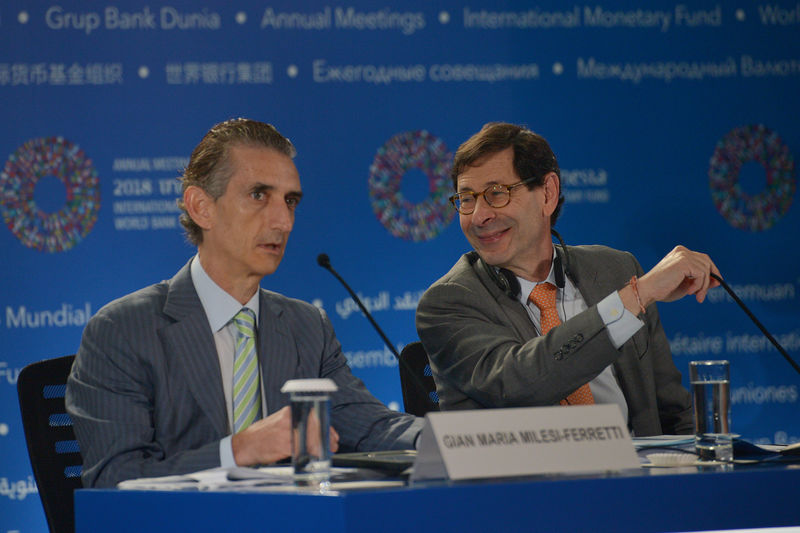By David Lawder
NUSA DUA, Indonesia (Reuters) - The International Monetary Fund on Tuesday cut its global economic growth forecasts for 2018 and 2019, saying that the U.S-China trade war was taking a toll and emerging markets were struggling with tighter liquidity and capital outflows.
The new forecasts, released on the Indonesian resort island of Bali where the IMF and World Bank annual meetings are getting underway, show that a burst of strong growth, fueled partly by U.S. tax cuts and rising demand for imports, was starting to wane.
The IMF said in an update to its World Economic Outlook it was now predicting 3.7 percent global growth in both 2018 and 2019, down from its July forecast of 3.9 percent growth for both years.
The downgrade reflects a confluence of factors, including the introduction of import tariffs between the United States and China, weaker performances by eurozone countries, Britain and Japan, and rising interest rates that are pressuring some emerging markets with capital outflows, notably Argentina, Brazil, Turkey, South Africa, Indonesia and Mexico.
"U.S. growth will decline once parts of its fiscal stimulus go into reverse," IMF chief economist Maurice Obstfeld said in a statement. "Notwithstanding the present demand momentum, we have downgraded our 2019 U.S. growth forecast owing to the recently enacted tariffs on a wide range of imports from China and China’s retaliation."
With much of the U.S.-China tariff war's impact to be felt next year, the Fund cut its 2019 U.S. growth forecast to 2.5 percent from 2.7 percent previously, while it cut China's 2019 growth forecast to 6.2 percent from 6.4 percent. It left 2018 growth forecasts for the two countries unchanged at 2.9 percent for the United States and 6.6 percent for China.
Obstfeld said he was not concerned about the Chinese government's ability to defend its currency against further weakening but told a news conference that Beijing would face a "balancing act" between actions to shore up growth and ensuring financial stability.
If China and the United States were to resolve their trade differences, it "would be a significant upside to the forecast."
The eurozone's 2018 growth forecast was cut to 2.0 percent from 2.2 percent previously, with Germany particularly hard hit by a drop in manufacturing orders and trade volumes.
Obstfeld said the IMF does not see a generalized pullback from emerging markets, nor contagion that will spill over to those emerging economies which have stronger economies and have thus far avoided major outflows, such as some in Asia and some oil and metals exporting countries.
"But there is no denying that the susceptibility to large global shocks has risen," Obstfeld said. "Any sharp reversal for emerging markets would pose a significant threat to advanced economies."
Brazil will see a 0.4 percentage-point drop in GDP growth to 1.4 percent for 2018 as a nationwide truckers strike paralyzed much of the economy. Iran, facing a new round of U.S. sanctions next month, also saw its growth forecast cut, the IMF said.
Some energy-rich emerging market countries have fared better due to higher oil prices, with Saudi Arabia and Russia receiving upgrades to growth forecasts.
The IMF said the balance of risks was now tilted to the downside, with a higher likelihood that financial conditions will tighten further as interest rates normalize, hurting emerging markets further at a time when U.S.-led demand growth will start to slow as some tax cuts expire.
Trade tensions are expected to continue although Fund officials view U.S.-Mexico-Canada trade agreement as a positive sign.
"Where we are now is we’ve gotten some bad news. Our probability that we would attach to further bad news has gone up," Obstfeld said.
TRADE WAR RISKS
In a new simulation exercise to show trade war risks to the global economy, the IMF modeled the effect of an all-out U.S.-China trade war, coupled with threatened global U.S. automotive tariffs and retaliation from trading partners.
The model also includes the effects of a reduction in business confidence that reduces investment and leads to a tightening of financial conditions.
It found that global GDP output under this scenario would fall by more than 0.8 percent in 2020 and remain roughly 0.4 percent lower in the long-term compared to levels without the effects of a trade war.
The repercussions for the United States and China would be particularly severe, with 2019 GDP losses of more than 0.9 percent in the United States and 1.6 percent in China in 2019.
The exercise assumes that U.S. President Donald Trump imposes tariffs on the remaining $267 billion worth of Chinese goods imports not already under punitive tariffs and China retaliates in kind. It also assumes that Trump imposes a 25 percent tariff on imported cars and auto parts.
Adjustments would occur as domestic production displaces higher-priced imports, the model shows, but in the long run, the U.S. GDP would still be 1.0 percent below a baseline without these tariffs, while China's GDP output would be one half percent below the baseline.
